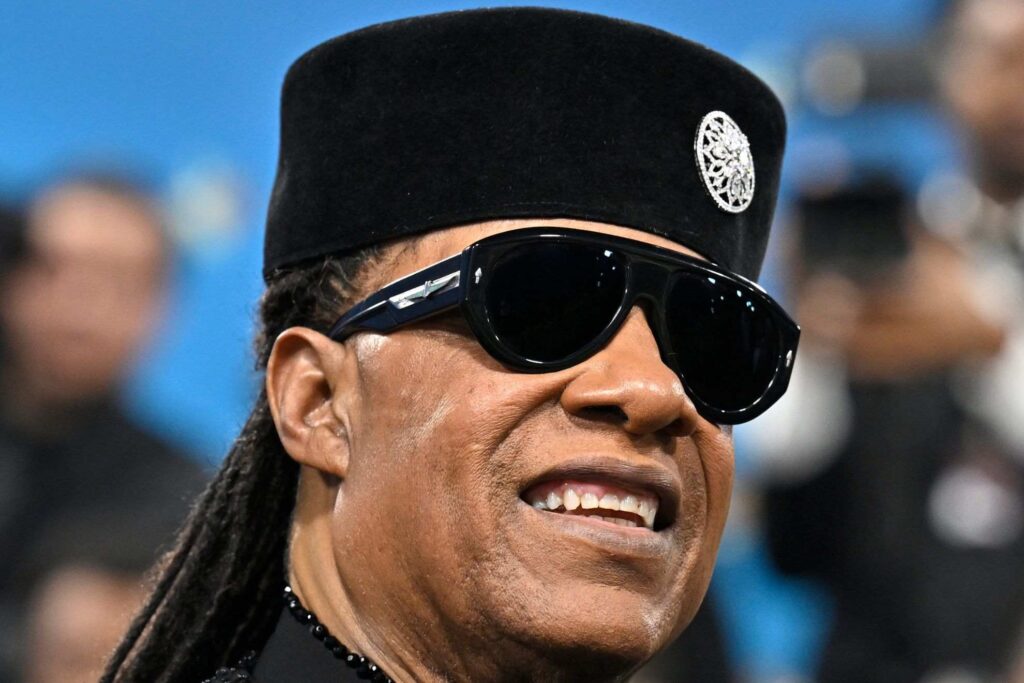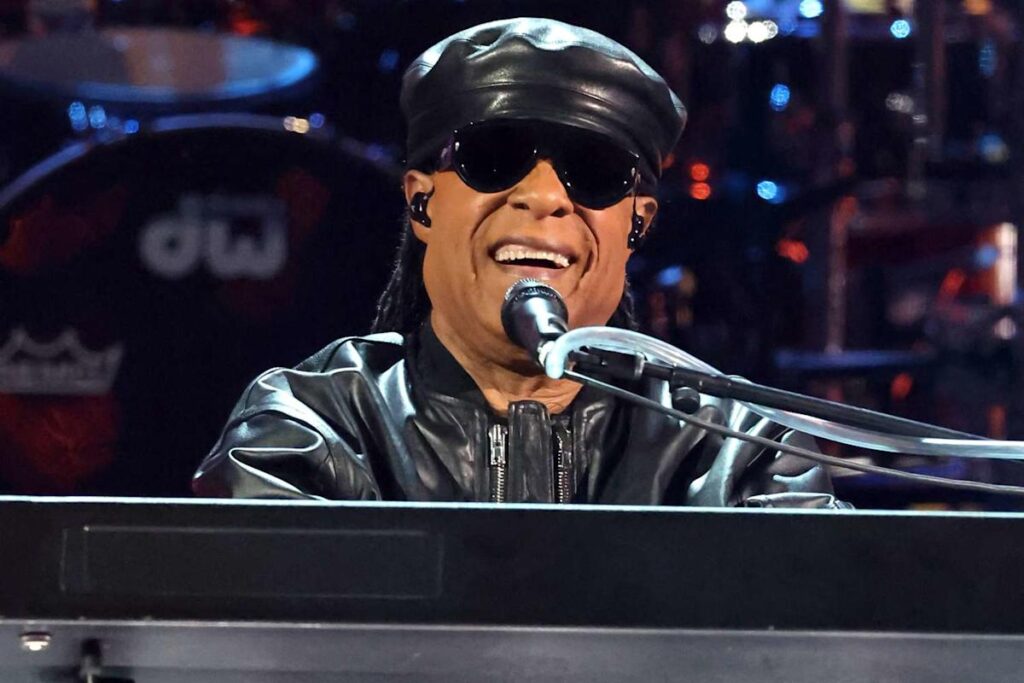For decades, Stevie Wonder’s extraordinary musical talent has defied limitations—transcending boundaries of genre, race, and even physical ability. But one rumor, persistent and baseless, has followed the multi-Grammy Award-winning legend throughout his career: the claim that he isn’t actually blind.
On July 9, during a soul-stirring appearance at Blackweir, a popular music concert series in Cardiff, Wales, Stevie Wonder finally addressed the long-standing whispers with honesty, grace, and an inspiring touch of wisdom. What unfolded was more than just a casual correction—it was a heartfelt moment of truth that resonated far beyond the audience in attendance.
“You know the truth,” Stevie told the cheering crowd between songs. “The truth is, shortly after my birth, I became blind. Now, that was a blessing because it allowed me to see the world in the vision of truth, of sight.”
These words struck a deep chord with many. Instead of offering a defensive denial or lashing out at the conspiracy theorists and internet jokesters, Wonder reframed his blindness as a profound gift. For him, the absence of physical sight has offered clarity in more meaningful ways—allowing him to connect with people based on their spirit and character rather than outward appearances.
“See people in the spirit of them,” he continued. “Not how they look, not what color they are, but what color is their spirit.”
In that simple but deeply powerful statement, Stevie Wonder dismantled decades of speculation with grace and offered the audience a glimpse into how he’s managed to live, thrive, and inspire in a world often obsessed with the superficial.
Wonder’s Cardiff performance wasn’t just memorable for his rare onstage address about his blindness—it was also a celebration of his iconic career. According to Welsh news reports, the music legend lit up the stage with fan favorites like “Living for the City” and “I Just Called to Say I Love You,” taking the audience on a heartfelt journey through his expansive musical catalog.
The venue, filled with long-time fans and newcomers alike, erupted into dance, tears, and applause as the familiar chords and Wonder’s soulful voice filled the air. But even amidst the joy of music, it was his candid moment about blindness that became the emotional heartbeat of the night.
It was vintage Stevie—honest, hopeful, and human.
For years, Stevie Wonder has been the subject of a peculiar kind of celebrity gossip. Despite the well-documented fact that he lost his sight shortly after birth due to complications from being born prematurely, some have clung to wild conspiracy theories suggesting otherwise. Fueling the rumors are out-of-context photos, tall tales from entertainers, and tongue-in-cheek anecdotes—often delivered more as jokes than as serious accusations.

The most notable collection of these stories comes from the popular hip-hop podcast “Drink Champs,” hosted by N.O.R.E. and DJ EFN. In one of the show’s viral segments, several celebrities share stories that jokingly suggest Wonder might not be as blind as he claims.
One of the most repeated tales comes from none other than Snoop Dogg. “On everything I love, Stevie Wonder does FaceTime me,” the rapper claimed with a laugh. Snoop said that Wonder once called him while he was getting his hair done. When he answered the video call, the music icon allegedly greeted him with: “I’ve been looking for you.”
It’s these kinds of anecdotes—sometimes clearly exaggerated, sometimes just playful—that have helped keep the “Stevie Wonder can see” rumor alive in pop culture.
To his credit, Stevie Wonder has often joined in on the jokes. He’s known for having a sharp sense of humor and doesn’t shy away from laughing at himself. He’s played piano at award shows with exaggerated swagger, occasionally “looking” toward his audience, and he’s even made sly references to the jokes in interviews.
But while he might laugh along for the sake of fun, Wonder has also made it clear that blindness is not something to mock or diminish. More importantly, it’s not something that has ever held him back.
In a 2012 interview with The Guardian, he spoke openly about how he views his identity. “I never thought of being blind as a disadvantage, and I never thought of being Black as a disadvantage,” he said. “I am what I am. I love me! And I don’t mean that egotistically—I love that God has allowed me to take whatever it was that I had and to make something out of it.”
That resilience and confidence have been a hallmark of his life and career.
Stevie Wonder’s contributions to the world stretch far beyond his music. He’s been a tireless advocate for civil rights, a vocal supporter of humanitarian causes, and a symbol of perseverance and hope. His blindness has never been a limitation—it’s been a lens through which he’s viewed the world with more heart and clarity than most sighted people could dream of.
From championing Martin Luther King Jr. Day as a national holiday to writing songs that capture the pain and triumph of the human experience, Wonder’s vision has always been one of compassion and unity. And perhaps that’s why the rumors about his eyesight, while persistent, never truly undermined his legacy.
People may joke. Some may even believe. But the truth remains: Stevie Wonder doesn’t need eyes to see the beauty of the world—or to change it.
There’s a deeper cultural question at the heart of this odd fixation with Stevie Wonder’s blindness. Why are some people so unwilling to believe that a blind man could be that talented, that confident, that successful?
The rumors may be funny on the surface, but they also reflect a subconscious bias—one that equates disability with deficiency. Stevie Wonder challenges that idea at every turn. His ability to perform, compose, and innovate musically is unparalleled, and for some, that seems almost “too good” to be true without sight.
But that’s the point. Stevie Wonder is living proof that disability does not mean inability.
His remarks in Cardiff weren’t just a personal revelation—they were a teaching moment. He used the platform to speak about the importance of seeing beyond the physical and into the spiritual, of judging people not by their appearance or background but by the essence of who they are.

That’s a message the world needs now more than ever.
Wonder’s words reminded us that true sight is not about what meets the eye—it’s about understanding, empathy, and soul. And those are things Stevie has in abundance.
The Cardiff concert, filled with joyous melodies and soul-stirring truths, served as a quiet reminder of why Stevie Wonder remains a towering figure in music and culture. While the internet may never completely let go of the conspiracy jokes, his response showed that he’s unbothered and grounded in something much greater than public perception.
In fact, Stevie’s life story is a masterclass in how to respond to ignorance—not with anger, but with purpose and grace. He doesn’t need to convince anyone of his truth. He’s been living it, unapologetically, for more than six decades.
As he continues to tour, record, and inspire, fans around the world will remember his Cardiff performance not just for the music, but for the message. A message that challenged shallow narratives, embraced vulnerability, and elevated the conversation to something far more powerful than gossip.
Stevie Wonder doesn’t need to see with his eyes to understand the world better than most. He’s lived a life full of vision—real vision. The kind that builds bridges, uplifts others, and makes history.
So the next time someone brings up those tired old jokes, maybe instead of laughing, we should listen—to his music, his message, and his reminder that spirit and soul are what matter most.
Because in Stevie Wonder’s world, the truest kind of sight comes from within.
